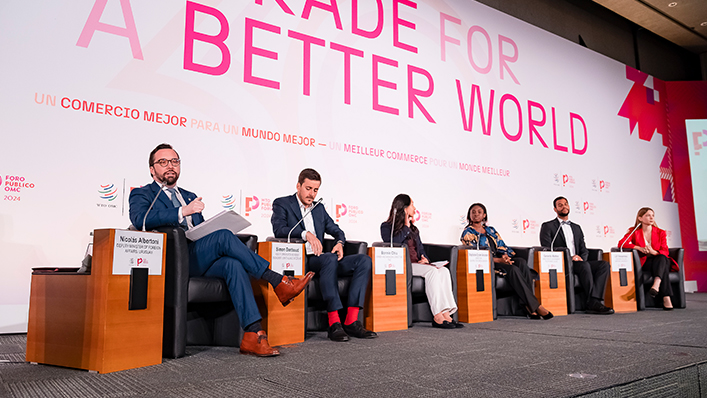
The panellists discussed the importance of reimagining trade through re-globalization and proposed concrete measures to create a more sustainable and inclusive global economy that can better serve future generations.
Lili Vessereau from Harvard University highlighted that the WTO and other multilateral institutions often become scapegoats for broader or national issues that should also fall under government responsibility. She pointed out that rising geopolitical tensions require the involvement of “new actors, including developing countries.” These actors can help build supply chains that “ensure we foster green growth through inclusivity, not solely through economics, but also through geopolitical alliances.”
Stephanie Eyram Akrumah of the Centre for Green Growth highlighted the challenges faced by the Global South, particularly African nations, in navigating various environmental standards and climate mitigation frameworks introduced by developed countries. These frameworks create significant barriers and hinder the Global South’s integration into global trade, she said. To enable developing countries to play a more active role in combating climate change, Ms Akrumah emphasized that the WTO, with its broad membership, “stands in a very central position” to unify these standards and “to incorporate the needs of the Global South, as well as those of the Global North.”
Bonnie Chiu of the Social Investment Consultancy underlined the issue of gender inequality in economic development, noting that the WTO has done a great deal to help reverse this situation. She also pointed to other issues limiting social inclusion in trade, such as the digital divide. Ms Chiu stressed that to achieve truly inclusive trade, all governments need to “have a different set of Key Performance Indicators, ensuring we are not only focusing on economic growth, but also on planetary and societal well-being,” she said.
Gerardo Matteo of GLASS, an e-commerce start-up, said his company operates an online marketplace for small businesses to tap into the US$ 3.7 trillion public procurement industry. He underscored the need for transparency and data accessibility to ensure small businesses have equal opportunities in the public procurement process. Mr Matteo also emphasized the importance of embracing new technologies in trade. “Let’s build new platforms and rethink how we do business. I believe the use of technology, e-commerce and emerging technologies like AI and blockchain are transforming both the private and public sectors, enabling public trade [to flourish],” he said.
Simon Berthoud of Climate Alliance, Switzerland, noted that young people bear the weight of climate change inherited from previous generations. He criticized the economy-centric development path and called for greater awareness of the planetary crisis and depleting natural resources. Mr Berthoud argued that GDP is an outdated metric. “An increase in GDP is not a precondition for realizing human rights or for combating poverty and inequalities,” he said. He also pointed to alternative business models, such as cooperatives owned by employees and consumers, which have proven to be more resilient and inclusive.
Director-General Ngozi Okonjo-Iweala thanked the participants for their “exciting” contributions and for challenging conventional thinking. She emphasized that the WTO should not be blamed for all the issues we face today, reminding the audience that the Marrakesh Agreement founding the WTO was established 30 years ago with the purpose of “enhancing living standards, creating employment, and supporting sustainable development.” She reiterated that the WTO has consistently delivered, and continues to deliver, positive environmental outcomes while promoting economic growth. She cited in particular the Fisheries Subsidies Agreement and other environment-related initiatives currently under discussion by WTO members.
In conclusion, the Director-General encouraged young people to continue advocating for sustainable development and pushing companies to operate more responsibly. “I love what you had to say, and I thank you. We have a lot of work to do,” she said.
Share
Reach us to explore global export and import deals